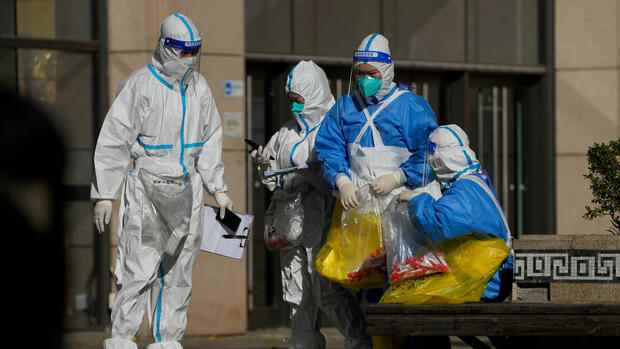Despite the negative consequences for the economy, the leadership in Beijing is sticking to its corona policy.
(Photo: AP)
A presentation is currently being passed around the executive floors of the EU Commission, which compiles data and diagrams on the gas market. The figure on page ten particularly stands out: “EU LNG imports benefit from low Chinese demand,” reads the headline. A few words that say a lot about the great geopolitical challenge in autumn 2022: the EU energy crisis and the complex relationship between Europe and China.
So much for the background: Europe’s ports are currently landing in unprecedented quantities of liquefied natural gas, the experts speak of “liquefied natural gas” or LNG. With Russia largely halting deliveries of pipeline gas, with three out of four Nord Stream strands even exploding under highly suspicious circumstances, Europeans are chasing LNG ships from the US, Canada and Qatar. One of the main factors behind European purchasing success on the world market is the failure of their main competitor – the People’s Republic of China.
The Commission’s chart shows that Asian countries imported 19 billion cubic meters less LNG between January and September compared to the same period last year. The Chinese alone account for 17 billion cubic meters of reduced demand. Much to the delight of European gas importers.
The fact that the EU is now going into the winter with full gas storage facilities is mainly due to one man: Chinese head of state and party leader Xi Jinping. Xi has imposed a rigorous zero-Covid policy on his country and stalled the economy with week-long lockdowns. Less growth means less hunger for energy. Europeans have an easier time on the world market.
Top jobs of the day
Find the best jobs now and
be notified by email.
Ironically, Xi, who is transforming China into a “systemic competitor” of the liberal democracies in Europe, is helping the Europeans through the winter. Of course, the weather is also playing along. The unusually warm autumn reduces gas consumption in the EU. The result: drastically falling prices. But the weather is moody, Xi is not.
>> Read here: How long does the gas last? Forecasts for the winter
The great leader steadfastly stays on course, his political destiny linked to Zero Covid. Even if he wanted to one day, Xi couldn’t just end his lockdown policy. Easing Covid restrictions is likely to mean death for hundreds of thousands of Chinese.
Every week, Moritz Koch, head of the Handelsblatt office in Brussels, analyzes trends and conflicts, regulatory projects and strategic concepts from the inner workings of the EU, alternating with other Brussels correspondents. Because anyone interested in business needs to know what’s going on in Brussels. You can reach him at: [email protected]
In early summer, Taiwan went through what China could face. The island republic had long relied on Zero Covid and isolated itself from the world. Taiwan reopened in May, the corona numbers shot up and with them the deaths.
In China, the consequences are likely to be even more dramatic. The People’s Republic has refused to import the effective mRNA vaccines from the West. Instead, she mainly relies on Sinovac and Sinopharm – agents that were developed in China but have a significantly lower protective effect.
Xi’s zero-Covid dilemma is working to Europe’s advantage in unexpected ways. Actually, the Chinese autocrat had promised Russian President Vladimir Putin “friendship without borders”. Now Xi is responsible for reducing the effectiveness of Putin’s most important weapon in the economic war against the West – Europe’s gas dependence. irony of history.
Chinese demand will increase again
On the other hand, it is clear that the insight of the US economist Herbert Stein also applies to Zero Covid: “If something cannot go on forever, it will stop.” That means: At some point Xi will have to find a way out, at some point Chinese demand will recover . Then it will be tight for Europe. In any case, the International Monetary Fund expects that the coming winter will be even more difficult than the current one.
“The energy crisis will not disappear so quickly, energy prices will remain high for a long time,” warned IMF Deputy Director Gita Gopinath in the Handelsblatt.
This scenario is also outlined on page 18 of the EU presentation. “China could return to the LNG market,” it says. China’s “LNG gap,” the difference between normal growth and actual demand, is estimated at 39.2 billion cubic meters of gas in 2022. If the Chinese economy recovers, the EU faces a bidding war. The global distribution battle for LNG has only just begun.
More: President Xi’s claims to omnipotence are a disaster for Europe’s companies
